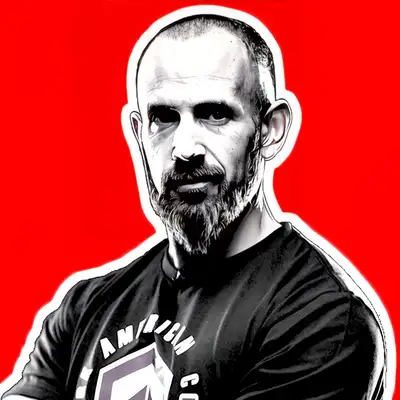Creators and Guests
What is Hard Hat Chat: No-BS Construction Discussion with Justin & Gerritt?
Hard Hat Chat is your backstage pass to the gritty and sometimes mind-blowing world of construction. Hosted by Justin Smith, CEO at Contractor Plus, and Gerritt Bake, CEO at American Contractor Network, this show is all about keeping it real—no corporate fluff, no sugarcoating. Tune in each week for straight talk on growing a contracting business, avoiding industry pitfalls, and sharing the occasional “holy sh*t, did that really happen?” job site story. Whether you’re a seasoned pro or just getting your boots dirty, you’ll pick up hard-earned insights and a few good laughs along the way. Join us, throw on your hard hat, and let’s build something awesome.
Welcome back for another episode of Hard Hat Chat. I'm Justin Smith, CEO at Contractor Plus.
Gerritt Bake:And I'm Garrett Baik with American Contractor Network. Today, we're diving into the situation that's frankly keeping a lot of people up at night on the West Coast.
Justin Smith:Today, we're going to talk about the devastating wildfires that just ripped through the Pacific Palisades and Altadena, leaving parts of Southern California with an enormous rebuild ahead. Literally, 12,000 structures completely destroyed.
Gerritt Bake:And to make things even more complicated, there's the current immigration policy that's creating some serious uncertainty about who's actually gonna do all this rebuilding.
Justin Smith:It's definitely a perfect storm of challenges, but we're going to break it all down for you today. From the massive cleanup effort to the labor force questions that could make or break the recovery, Let me paint a picture of just how massive this devastation is. We're looking at 12,000 structures destroyed with a staggering $40,000,000,000 in estimated damages.
Gerritt Bake:You know, Justin, I've been in construction for years, but these numbers are just mind blowing. And what's crazy is that rebuilding the actual homes might be the easiest part of this whole thing.
Justin Smith:Exactly right. Before we can even think about putting up new structures, we're talking about clearing tens of thousands of acres of hazardous debris. It's not just charred wood we're dealing with. It's toxic materials that need special handling.
Gerritt Bake:And this isn't like cleaning up after a regular demolition job. Every lot has to be brought back to buildable condition, which means comprehensive environmental testing, proper disposal of hazardous materials, and making sure the ground itself is stable enough for new construction.
Justin Smith:The state and local government are trying to speed things up. Governor Newsom and mayor Bass have both issued executive orders to cut through some of the red tape. They're suspending certain environmental reviews and streamlining the permitting process.
Gerritt Bake:But even with those measures in place, we're still looking at a cleanup effort that's gonna take months, if not years, and that's before a single foundation gets poured for these new homes.
Justin Smith:And let's not forget, while all this is happening, we've still got active fires. The Hughes fire was at 98% containment last time I checked. Now let's dive into what these rebuilding efforts are actually going to look like.
Gerritt Bake:The regulatory landscape has changed dramatically since many of these homes were first built. Take doctor Raskin's home in Pacific Palisades, built back in '98. The fire codes we have today, totally different ballgame. These homeowners are going to have to rebuild to much stricter standards.
Justin Smith:We're talking about something called wildland urban interface codes. Can you break down what that means for our listeners, Garrett?
Gerritt Bake:Absolutely. These codes mandate fire resilient construction in high risk fire zones. We're talking about specialized materials for everything. The lumber, siding, insulation, windows, roofing, all designed specifically to resist fire.
Justin Smith:And I imagine these materials aren't exactly cheap.
Gerritt Bake:No. They're not. And here's where it gets complicated. While we may be good for the next thirty days depending on what ends up happening with these increased tariffs on Canadian lumber, this could drive prices even higher. Plus, with this many rebuilds happening at once, we might see some serious supply chain bottlenecks.
Justin Smith:Won't governor Newsom's executive order help streamline some of the permitting process, though?
Gerritt Bake:Yeah. They've suspended some requirements under the California Environmental Quality Act and the Coastal Act. Mayor Bass is also expediting permits and debris removal. But even with these shortcuts, we're still looking at a massive regulatory process.
Justin Smith:You know what's interesting? I was talking to one of our contractors in LA yesterday who said even with all these fast track measures, most homeowners are looking at a minimum of three years before they can move back in.
Gerritt Bake:And that's if everything goes smoothly. Between getting insurance approvals, architectural plans drawn up, permits processed, and dealing with all these new building requirements, it's going to be a marathon, not a sprint.
Justin Smith:Not to mention, every single one of these homes needs individual attention. These aren't cookie cutter rebuilds we're talking about. Each property has its own specific challenges and requirements. You know what's really interesting about this whole situation? The construction industry in California relies heavily on immigrant workers.
Justin Smith:We're talking about 41% of the workforce.
Gerritt Bake:And that number is actually even higher in residential construction. Some estimates put it closer to 60 or 70% when you're talking about home building specifically.
Justin Smith:I was looking at these numbers from the National Association of Home Builders, and it's pretty staggering. The US construction industry already has about 276,000 unfilled jobs, and that's before this disaster.
Gerritt Bake:And now we're looking at rebuilding 12,000 structures just in the LA area. The math just doesn't add up without that immigrant workforce.
Justin Smith:What's really concerning is the timing of all this. We've got this massive rebuilding effort that needs to happen, but there's also this uncertainty around immigration policy that could seriously impact the available workforce.
Gerritt Bake:Exactly. I was talking to some contractors in the area, and they're already seeing impacts. Some workers are becoming hesitant to take jobs in high profile areas like the fire zone. They're mostly worried about increased scrutiny.
Justin Smith:And it's not just about the workers who might be directly affected. The whole industry is interconnected. If you don't have enough people doing the foundational work, framing, drywall, roofing, it creates bottlenecks for everything else.
Gerritt Bake:Right. Even jobs that typically go to US born workers like electrical and plumbing work can't happen until the basic structure is in place. It's really a domino effect.
Justin Smith:We're also hearing that some contractors are already having trouble getting commitments from their usual crews for these rebuilding projects, which could really slow down the recovery process.
Gerritt Bake:And let's be honest. This isn't just about the immediate rebuilding. LA is also preparing for the twenty twenty eight Olympics, and there were already concerns about having enough workers for those projects. This situation just compounds that problem.
Justin Smith:Let's talk about the broader economic picture here because this situation is affecting way more than just the construction industry.
Gerritt Bake:Yeah. We're seeing ripple effects throughout the entire supply chain. I was looking at some reports from logistics experts, and while the immediate impact from the fires wasn't too bad, they're predicting some serious challenges once rebuilding starts.
Justin Smith:That's right. I mean, just think about the storage demands alone. All these building materials, drywall, cabinetry, plumbing supplies, roofing materials, they all need to be warehoused somewhere before they reach the job site.
Gerritt Bake:Exactly. CBRE experts are saying we're going to see increased demand for both traditional warehouse space and what they call industrial outdoor storage, you know, for things like poles, beams, and wiring.
Justin Smith:That's gonna drive up costs across the board. Higher storage costs mean higher material costs, which ultimately means more expensive rebuilding projects.
Gerritt Bake:And here's something people might not think about. Undocumented workers in California contribute about $8,500,000,000 in local and state taxes annually. If we see a significant reduction in that workforce, it's not just about lost labor. It's about lost tax revenue too.
Justin Smith:The numbers are pretty striking. Looking at wage differences, US born construction workers typically earn around $30 an hour in California, while immigrant workers average about 24 and undocumented workers about 16.
Gerritt Bake:And that wage differential has actually helped keep construction costs somewhat manageable. If we lose a significant portion of that workforce, we're not just looking at a labor shortage. We're looking at potentially much higher construction costs across the board.
Justin Smith:So let's talk solutions here, man. What can actually be done to address these challenges we're facing with the rebuild?
Gerritt Bake:Well, some industry groups like the National Association of Home Builders have been pushing for a guest worker program, which could help address the immediate labor shortage while providing legal pathways for workers.
Justin Smith:That makes a ton of sense to me. I take everything governor Newsom says with a grain of salt, but he and mayor Bass appear to be taking some steps to help make that possible, like streamlining the permitting process and suspending certain environmental review requirements to speed things up.
Gerritt Bake:A lot of builders are also getting creative with their approach. They're looking at doing things like forming cooperative arrangements where they can share labor pools and resources to maximize efficiency.
Justin Smith:You know what's interesting? Some companies are also exploring new construction technologies and prefabrication methods that require fewer workers on-site. It's not a complete solution, but it could help offset some of the labor shortage issues.
Gerritt Bake:True, Justin, but we need to be realistic about the timeline here. Most communities are saying it'll be two to three years before any significant reconstruction can begin just because of all the infrastructure work that needs to happen first.
Justin Smith:That actually gives us a decent window of opportunity to develop better systems and processes. I've heard some contractors are already working on training programs to expand the skilled labor force locally.
Gerritt Bake:Right. And there's also been talk about creating partnerships between construction companies and local community colleges to develop workforce training programs. It's not just about finding workers. It's about creating new ones.
Justin Smith:The insurance industry needs to be part of the solution too. We're seeing some interesting proposals for new insurance models that could help streamline the rebuilding process and make it more efficient.
Gerritt Bake:Bottom line is there's no single silver bullet here. It's gonna take a combination of policy changes, industry adaptation, and community cooperation to make this work.
Justin Smith:You know, Garrett, when we look at everything we've discussed today, it really drives home just how complex this whole situation is.
Gerritt Bake:It sure does. We're looking at a perfect storm of challenges, the largest wildfire reconstruction effort in US history, a severe labor shortage, and potential policy changes that could make everything even more complicated.
Justin Smith:I'm actually somewhat optimistic. The construction industry has always been resilient and adaptable. We've seen it time and time again.
Gerritt Bake:Absolutely. And if there's one thing that's clear, it's that solving this is going to require everyone working together, government, industry, and communities.
Justin Smith:Well, folks, that's all the time we have for today's hard hat chat. Thanks for joining us for this important discussion. Until next time, keep building smart and stay safe out there.
Gerritt Bake:If you like this episode, be sure to give us a follow or subscribe wherever you listen to your podcasts, and we'll catch you on the next one.

